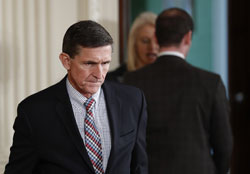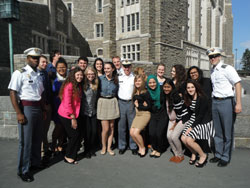National Security Advisor Michael T. Flynn resigned after misleading Vice President Mike Pence and other administration officials of the nature of his calls between the Russian ambassador to the United States on Monday, Feb. 13.
Flynn’s resignation surfaced less than a month after his tenure began when the Justice Department alerted President Donald Trump of Flynn’s innacurate recollection of his communication with the ambassador. The Justice Department also warned the administration that the former National Security Advisor was potentially vulnerable to blackmail by Moscow.
In his resignation letter, Flynn wrote, “I inadvertently briefed the Vice President and others with incomplete information regarding my phone calls with the Russian ambassador. I have sincerely apologized to the President and the Vice President, and they have accepted my apology.”
He continued, “I know with the strong leadership of President Trump and Vice President Pence and the superb team they are assembling, this team will go down in history as one of the greatest presidencies in U.S. history.”
According to CNN, Flynn’s resignation makes for one of the shortest-serving senior presidential advisors in modern history. Representative Devin Nunes, a California Republican and Chairman of the House Intelligence Committee, said, “Washington, D.C., can be a rough town for honorable people, and Flynn — who has always been a soldier, not a politician — deserves America’s gratitude and respect.”
An administration official said of Trump’s reaction, “He’s moving on.”
However, the sudden departure of one of Trump’s closest and most senior advisors, who has assisted the President on issues of security and foreign policy since early in the presidential race, has been added to the list of tumultuous events in his first month in office.
Republican Senator of Arizona, John McCain, said, “It’s a dysfunctional White House.Nobody knows who’s in charge and nobody knows who’s setting policies.”
Specialist professor of public history, Melissa Ziobro, said, “It certainly appears as if the White House is in turmoil, with positions unfilled, staff infighting, and leaks.”
According to the New York Times, Trump and his closest advisors have welcomed the chaos, asserting that the shake-ups are evidence of their efforts to reorganize the government.
Ken Mitchell, Chair of the Department of Political Science and Sociology, considers the issue of Trump’s turmoil as multifaceted and indefinite. He compared the first month of Trump in office with the early Clinton administration in that other matters he had to address stifled the issues that he campaigned on.
This, in turn, resulted in criticism, as “this kind of instability is distracting and damaging to his brand,” he continued.
A similar pattern is happening with Trump in that other issues are pushing aside his campaign promises. Mitchell cites the debt ceiling as another obstacle Trump will soon face, “and everybody is watching.”
Mitchell also said the, “CSA, FBI, and NSA appear to be hostile to the new president.” He explained that many of the more permanent bureaucracy from the [Bill] Clinton, [George]Bush, and [Barack] Obama administrations are products of the Cold War, meaning they do not trust Russia, and are unlikely to share the same vision as the president.
He said, “As someone who is not a politician, Trump doesn’t have experience with working with people he can’t fire. He has a lifetime of experience where he hires and fires whoever he wants,” however, “this is not how the federal government works because we have checks and balances”
Rather than naïve of how the federal government works, Mitchell sees Trump as a product of his business environment, and a learning curve is occurring.
Emma Ientile, a freshman at Monmouth, said, “I think a certain amount of chaos in the beginning is normal, and people are only concerned because Trump doesn’t have a lot of political experience.”
Ziobro remains critical of Trump’s first month in office. She said, “I think the idea of necessary turmoil has its utility for the White House, but having to request resignation of people you yourself hired is an interesting way to start draining the swamp.”
President Trump named Army Lt. Gen. H.R McMaster as his new national security adviser, on Monday.
IMAGE TAKEN from http://www.businessinsider.com/michael-flynn-resignation-timeline-2017-2



